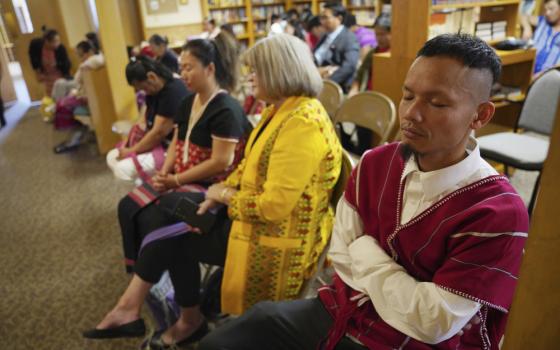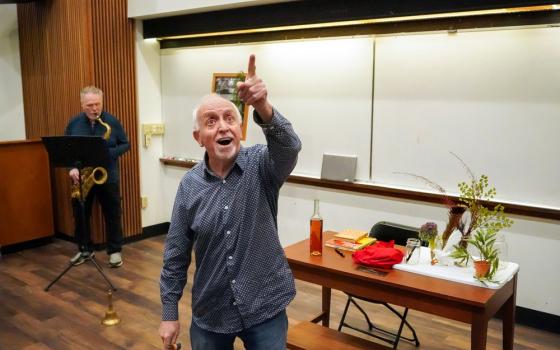
(Unsplash/Erik Odiin)
In the early 1990s, I was director of a residential treatment center in Westchester County, New York, called St. Christopher's. Seventy-two teenage males and females lived there and attended the school on our grounds. They were from the lowest-income, highest-crime neighborhoods of New York City. Most had been in and out of foster homes their entire lives. They came from families rife with domestic violence, alcoholism and substance abuse disorders. Some had criminal histories themselves.
We had two maintenance people on staff, Ray and Tim, and when school got out each day, they worked with a small group of kids to teach them carpentry, plumbing and painting. One day Tim approached me with an idea.
"My family owns a house in Syracuse, about five hours from here. Let's take some of these kids skiing one weekend. There's a pretty easy mountain nearby, they'd love it."I said, "Good idea," but probably was thinking, "That is not such a good idea." I knew from years of experience that kids in a controlled environment like ours often behaved well there, but when removed they could soon display negative if not violent behaviors, none of which Ray nor Tim were trained to handle.
A few days later 14-year-old Leon approached me and excitedly said, "Mr. Redmond, I heard we're going skiing next weekend!"
Well, I thought, I guess we are.
Advertisement
That Friday night, Leon and three other boys piled into a van. I was the driver. My 6-year-old son Aiden came with us. Ray and Tim would meet us in Syracuse.
The next morning the sun was glistening on the snow but my son wasn't feeling well, so I stayed back and gave Tim a few hundred dollars in cash, telling him, "That should be plenty for two days of lift tickets, lunch and snacks."
An hour later Tim called me.
"You on the slopes?" I asked.
"Well, not quite," he replied. "The boys said they needed some equipment, so I stopped at a ski shop. I wasn't watching them and they bought Bolle visors, Olympia gloves, all high-end stuff. The money's all gone. Can you give me your credit card number so we can buy lift tickets?"
I was furious. I stewed about those boys all day. They came back around 5. "We loved it, Mr. Redmond! Thank you. We can't wait to go back tomorrow!"
I grabbed one of the expensive visors and said, "You're not going back. You blew all the money on this stuff. Skiing is done."
We had dinner but didn't talk much. Ray and Tim hit the sack, I watched television with the boys, and during a commercial break I got up to get a soft drink from the kitchen when I heard one of the boys, Kasey, murmur to himself, "Today was the most fun I ever had."
I stopped in the doorway. There was something about the way he said it. It wasn't directed to me. He wasn't saying it to the other boys either. It was a statement of recognition, not meant to manipulate or gain something, just the plain truth for him.
I turned to Kasey and said, "You mean this is the most fun you've had since you've been at St. Christopher's?"
"No," he replied. "In my life. Today was the most fun I've ever had in my life."
In that very second, my soul perceived there was something far more important here than holding the boys accountable for the money they'd blown. I could not help but remember the Gospel story where Jesus and his disciples are walking through a field of grain and they are hungry and Jesus gives them the OK to pick some heads and eat them. The Pharisees see this and get all up in a dither, complaining, "Our law says you cannot do that on the Sabbath!" But Jesus knows something else. He knows there are things more important than a human law on when to pick grain.
There are also some things more important than what kind of ski gloves to pick out.
I walked into Ray and Tim's room.
"Set your alarm," I said. "We're going skiing tomorrow."
Ray replied, "But I thought you said …"
"I know, but one of those boys just told me that today was the most fun he ever had in his entire life. We're going skiing."
And we did. It was by turns hilarious and scary, watching these kids out on the slopes. They had no idea what they were doing, but they loved it. They knew something like joy. They were the last ones off the mountain that day. When I drove us back to St. Christopher's, they slept the entire way.
Over the next several months, each boys left St. Christopher's to move back home or to some other placement. Ray and Tim found jobs elsewhere, too.
One year later, I received a phone call from Kasey.
"Mr. Redmond, I know I don't live at St. Christopher's any more, but if you go skiing again, do you think I can come?"
"Of course," I told him.
We never did go skiing again, that year or any other year.
That was almost 30 years ago.
But when I think of those boys, and that weekend, I hope and pray that the memory of it worked for some good in their lives. I think of what Fr. Zosima says in Fyodor Dostoyevsky's novel The Brothers Karamazov:
You must know that there is nothing higher, or stronger, or sounder, or more useful afterwards in life, than some good memory, especially a memory from childhood, from the parental home. You hear a lot said about your education, yet some such beautiful, sacred memory, preserved from childhood, is perhaps the best education. If a man stores up many such memories to take into life, then he is saved for his whole life. And even if only one good memory remains with us in our hearts, that alone may serve some day for our salvation.
My soul has come to know that weekend was not about the gloves. It wasn't even about skiing.








